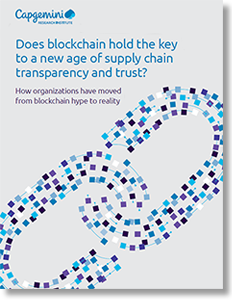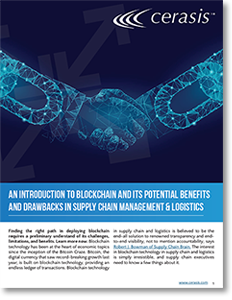Blockchain Ready to Transform Global Supply Chains By 2025

Worldwide analysis of leading organizations implementing blockchain by the Capgemini Research Institute demonstrates the technology’s potential to transform supply chains across the globe.
Blockchain Entering Mainstream
A report by the Capgemini Research Institute reveals that blockchain could become ubiquitous by 2025, entering the mainstream business and underpinning supply chains worldwide.
Through investment and partnerships, the distributed ledger technology will dominate manufacturing as well as consumer products and retail industries, ushering in a new era of transparency and trust.
The report, “Does blockchain hold the key to a new age of supply chain transparency and trust?”, provides a comprehensive overview of the businesses and geographies that are ramping up their blockchain readiness, and predicts that blockchain will enter mainstream use in supply chains by 2025.
Currently, just 3% of organizations that are deploying blockchain do so at scale and 10% have a pilot in place, with 87% of respondents reporting to be in the early stages of experimentation with blockchain.
The UK (22%) and France (17%) currently lead the way with at-scale and pilot implementation[1] of blockchain in Europe, while the USA (18%) is a front-runner in terms of funding blockchain initiatives. These “pacesetters”[2] are optimistic that blockchain will deliver on its potential, with over 60% believing that blockchain is already transforming the way they collaborate with their partners.
The study also found that cost saving (89%), enhanced traceability (81%) and enhanced transparency (79%) are the top three drivers behind current investments in the blockchain. Furthermore, blockchain enables information to be delivered securely, faster and more transparently.
The technology can be applied to critical supply chain functions, from tracking production to monitoring food-chains and ensuring regulatory compliance. Enthused by the results they are seeing, the pacesetters identified in the study are set to grow their blockchain investment by 30% in the next three years.
Despite the optimism surrounding blockchain deployments, concerns remain around establishing a clear return-on-investment, and interoperability between partners in a supply chain. The majority (92%) of pacesetters point to establishing ROI as the greatest challenge to adoption, and 80% cite interoperability with legacy systems as a major operational challenge. Additionally, 82% point to the security of transactions as inhibiting partner adoption of their blockchain applications, undermining blockchain’s status as a secure technology.
Sudhir Pai, Chief Technology Officer for Financial Services at Capgemini said;
“There are some really exciting use cases in the marketplace that are showing the benefits of blockchain for improving the supply chain, but blockchain is not a silver bullet solution for an organization’s supply chain challenges. Blockchain’s ROI has not yet been quantified, and business models and processes will need to be redesigned for its adoption. Effective partnerships are needed across the supply chain to build an ecosystem-based blockchain strategy, integrated with broader technology deployments, to ensure that it can realize its potential.”
In a previous report[3] conducted earlier this year with Swinburne University of Technology in Australia, Capgemini found that experimentation in blockchain will peak in 2020 as organizations explore proofs of concept and branch out from Fintechs. According to the report, blockchain transformation will mature in 2025 as organizations undertake enterprise transformation and integration, establishing policies for privacy and data management.
Professor Aleks Subic, Deputy Vice-Chancellor (Research and Development) of Swinburne University of Technology said, “Organizations trust blockchain technology to solve key issues and create new business opportunities, and it lends credibility to the digital ecosystem across the supply chain. We believe that blockchain technology will play an integral role in the digital transformation of supply chain channels for a wide range of industries in the near future.”
Despite the barriers facing blockchain today, organizations are trying to drive wider adoption now while the technology is in its early stage. One example is the Mobility Open Blockchain Initiative (MOBI), a consortium comprised of a group of auto and tech companies focused on getting carmakers to assign digital identities to vehicles so that cars and systems can transact with each other.[4]
Current Industry Use Cases
Capgemini Research Institute’s report identified 24 use cases for blockchain, ranging from trading carbon credits to managing supplier contracts and preventing counterfeit products. Capgemini applied these use cases to retail, manufacturing and consumer products, finding that blockchain can be and is being used for tracing and tracking the production, provenance, and inventory of contracts, products, and services.
The report highlights that consumer product organizations are notably focused on tracing and identifying products, with Nestlé, Unilever and Tyson Foods implementing blockchain trials[5]. Retailers are focused on digital marketplaces and preventing counterfeits, with the likes of Starbucks investing in blockchain trials[6]. More critically, blockchain can safeguard food supplies, tracing food from farm to fork, to head off contamination or product recalls.
Sudhir Pai concludes, “Our study underscores blockchain’s potential but also shows that currently there are few large-scale implementations of this technology and clear barriers to adoption. Organizations should use our analysis of the pacesetting organizations to understand how feasible blockchain is for them, strengthening their blockchain program, and turning hype into a reality.”
Research Methodology
The Capgemini Research Institute surveyed around 450 organizations where blockchain implementation is underway in their supply chain as a proof of concept, pilot or at-scale. The research probed their approach to the blockchain, the applications they are implementing and the challenges they are facing in scaling their initiatives. The respondents were drawn from across the consumer products, retail, and manufacturing industries.
Image & Article Source: Capgemini
References
[1] A pilot is an initial rollout with limited scope and at a single site. At-scale implementations are multi-site or enterprise-level implementations with a complete scope. 22% of organizations in the UK that are experimenting with Blockchain are either deploying pilots or implementing at scale against 17% in France and 18% in the USA.
[2] The report identifies a group of leading organizations as “pacesetters”. This cohort is made up of the 13% of respondents who are either implementing blockchain at-scale (3% of the sample) or have pilots in at least one site (10% of the sample). These organizations are thus setting the pace for the rest of them.
[3] Source: Capgemini “ Why Blockchain is at the heart of the Fourth Industrial Revolution and Digital Economy?”, October 5, 2018.
[4] Source: Automotive News Europe, “Automakers, suppliers team up to develop blockchain technology”, May 2018.
[5] Source: Reuters, “Nestle, Unilever, Tyson and others team with IBM on blockchain”, August 2017.
[6] Source: Risnews, “Unbreakable Trust: 5 Retailers Exploring Blockchain”, April 2018.
Download the Report “Does blockchain hold the key to a new age of supply chain transparency and trust?”

Related Blockchain White Papers
Does Blockchain Hold the Key to a New Age of Supply Chain Transparency and Trust?
Organizations can use the analysis in this report of applications being implemented and the characteristics of pace-setting organizations to understand how feasible this technology is for them and how to go about implementing their own blockchain programs. Download Now!
Bridge to Blockchain: A Platform for Orchestrating Multi-Enterprise Networks
In this white paper, you will learn why blockchain platforms vary widely in terms capability, disclosure, confidentiality, anonymity, the cost to use, and speed, and why companies need to leverage more than one blockchain network to realize game-changing business models. Download Now!
An Introduction to Blockchain in Supply Chain Management
In the new, exclusive, and educational resource, “An Introduction to Blockchain and Its Potential Benefits and Drawbacks in Supply Chain Management,” you will learn and understand Blockchain's role in the industry and what supply chain executives need to consider now and in the future. Download Now!
Can Blockchain Revolutionize the Supply Chain?
In this white paper Ranjit Notani, One Network CTO examines Blockchain’s powerful potential as well as a major problem and whether and how Blockchains can revolutionize the Supply Chain. Download Now!
Article Topics
Capgemini News & Resources
Risk Management: Building resilient supply chains in a risky world Reverse logistics in need of some love 2024 WMS Update: At the intersection of warehousing and e-commerce 6 TMS Trends for 2024 Yard Management Systems (YMS): A must-have for the modern operation Six emerging supply chain software trends to watch Steady march into the cloud More CapgeminiLatest in Technology
Biden Gives Samsung $6.4 Billion For Texas Semiconductor Plants Apple Overtaken as World’s Largest Phone Seller Walmart Unleashes Autonomous Lift Trucks at Four High-Tech DCs Talking Supply Chain: Procurement and the AI revolution 80% of Companies Still Unsure How to Best Leverage AI, Study Finds Supply Chain Stability Index: “Tremendous Improvement” in 2023 AI Not a Priority for Retailers and CPG Companies More Technology


















